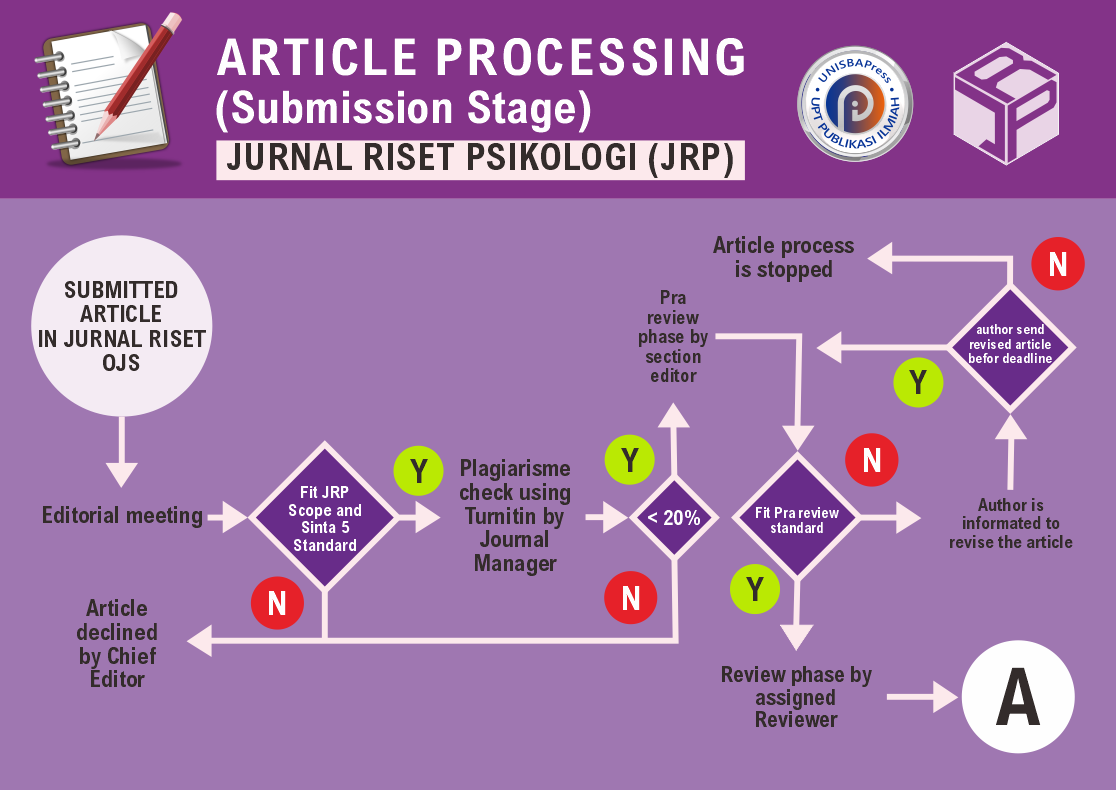Gratitude dan Psychological Well Being pada Penyintas Covid-19
DOI:
https://doi.org/10.29313/jrp.v2i2.1601Keywords:
Gratitude, Psychological Well Being, Penyintas Covid-19Abstract
Abstract. As a COVID-19 survivors, the fear of being stigmatized by society and feeling isolated from their social environment has certainly been felt. This condition has an impact on the unhappiness and psychological well-being of COVID-19 survivors. However, some people who have been exposed to COVID-19 and recovered define it as a life process. Moreover, there is hope to get out of problem and look at it positively with gratitude, because gratitude provides benefits for individuals in dealing with their problems which will have an impact on their psychological well-being. The purpose of this research was to see the relationship between gratitude and psychological well being on covid-19 survivors. The research was design by using quantitative methods, with simple linear regression analysis techniques. The research was conducted on 54 covid-19 survivors, obtained by the incidental sampling method. The measurement was using a psychological well being scale adapted from Carol D. Ryff and a Gratitude Scale adapted from Ratih Arum Listiandini. The results showed that the correlation coefficient was 0.355 and 0.008 significance. It can be concluded that gratitude and psychological well being have a positive and significant relationship between the variables of gratitude and psychological well being on covid-19 survivors.
Abstrak. Sebagai penyintas covid-19 ketakutan akan stigma masyarakat dan merasa terkucilkan dari lingkungan sosialnya tentu pernah dirasakan. Kondisi tersebut berdampak pada ketidakbahagiaan dan kesejahteraan psikologis penyintas covid-19. Akan tetapi sebagian orang yang pernah terpapar covid-19 dan sembuh memaknainya sebagai proses kehidupannya. Selain itu, adanya harapan untuk keluar dari kesulitannya dan memandang secara positif dengan bersyukur, karena rasa syukur memberikan manfaat bagi individu dalam menghadapi masalahnya yang akan berdampak terhadap kesejahteraan psikologisnya. Tujuan penelitian adalah untuk melihat hubungan antara gratitude dan psychological well being pada penyintas covid-19. Rancangan penelitian menggunakan metode kuantitatif, dengan tekhnik analisis regresi linier sederhana. Penelitian dilakukan kepada 54 penyintasi covid-19, diperoleh dengan metode incidental sampling. Pengukuran menggunakan skala psychological well being yang diadaptasi dari Carol D. Ryff dan Skala Kebersyukuran yang diadapitasi dari Ratih Arum Listiyandini. Hasil penelitian menunjukkan bahwa koefisien korelasi sebesar 0,355 dengan signifikansi 0,008. Dapat disimpulkan bahwa gratitude dan psychological well being memiliki hubungan yang positif dan signifikan antara variable gratitude dan psychological well being pada penyintas covid-19.
References
& M. Akmal, “Konsep Syukur (Gratefulnes), Kajian Empiris Makna Syukur Bagi Guru Pon-Pes Darunnadhah Thawalib Bangkinang Seberang Kampar, Riau,” J. Komun. dan Pendidik. Islam, vol. 7, no. 11, pp. 1–11, 2018, doi: https://doi.org/10.36668/jal.v7i2.86.
M. E. P. Peterson, C & Seligman, Character strengths and virtues: A classification and handbook. New York: Oxford University Press, 2004.
American Heritage Dictionary of the English Language, Hoghton Mifflin. USA: Company, 2009.
Muhammad Syafi’ie el-Bantanie, Dahsyatnya Syukur. Jakarta: Qultum Media, 2009.
M. . Emmons, R.A, & McCullough, The Psychology of Gratitude. Oxford University, 2004.
L. Sheldon, K, M., & Sonja, “How To Increase And Sustain Positive Emotion: The Effects Of Expressing Gratitude And Visualizing Best Possible Selves,” J. Posit. Psychol., vol. 1, no. 2, pp. 73–82, 2006, doi: 10.1080/17439760500510676.
A. Romdhon, “kebersyukuran Sebagai Sebuah Strategi Coping,” J. dipresentasikan pada Kongr. Asosisasi Psikol. Islam Ke-3 di Malang, 2011.
Gita Safira and Temi Damayanti D, “Pengaruh Academic Self Efficacy terhadap Penyesuaian Akademik Mahasiswa pada Pembelajaran Jarak Jauh,” J. Ris. Psikol., vol. 1, no. 2, pp. 109–118, Jan. 2022, doi: 10.29313/jrp.v1i2.462.
L. Listiyandini, R, A., Nathania, A., Syahniar, D., & Sonia, “Mengukur Rasa Syukur: Pengembangan Model Awal Skala Bersyukur Versi Indonesia,” J. Psikol. Ulayat, vol. 2, no. 2, pp. 473–496, 2015, doi: https://doi.org/10.24854/jpu39.
Y. Amir, “Pengembangan skala religiusitas untuk subyek muslim,” Indones. J. Psychol. Relig., vol. 1, no. 1, pp. 47–60, 2021.
M. Muslim, “Manajemen stress pada masa pandemi covid-19,” ESENSI J. Manaj. Bisnis, vol. 23, no. 2, pp. 192–201, 2020.
C. D. Ryff and C. L. M. Keyes, “The Structure of Psychological Well-Being Revisited,” J. Pers. Soc. Psychol., vol. 69, no. 4, pp. 719–727, 1995, doi: 10.1037/0022-3514.69.4.719.
M. K. Baumgardner, S. R. & Crothers, Positive Psychology. Upper Saddle River. New York: Pearson Prentice, 2010.
S. Linley, P. A., & Joseph, Positive Psychology in Practice. USA: Jonh Wiley & Sons, Inc, 2004.
C. L. . Ryff, C.D., & Keyes, “The Structure of Psychological Well-Being revisited,” J. Personal. Soc. Psychol., vol. 69, no. 4, pp. 719–727, 1995, doi: https://doi.org/10.1037/0022-3514.69.4.719.
Akbar M. R, “Hubungan Kebersyukuran dengan Psychological Well Being pada Pasien yang Mengidap Penyakit Diabetes Militus Tipe 2,” Universitas Islam Yogyakarta, 2018. [Online]. Available: https://dspace.uii.ac.id/handle/123456789/6548
Tsegaye, A Comparative Study of Psychological Wellbeing between Orphan and Non-orphan Children in Addis Ababa : The Case of Three Selected Schools in Yeka Sub-city. Afework, 2013.
A. Prabowo, Gratitude dan Psychological Well Being pada Remaja. Jurnal Ilmiah Psikologi Terapan, Fakultas Psikologi Universtas Muhammadiyah Malang. 2017. [Online]. Available: https://ejournal.umm.ac.id/index.php/jipt/article/view/4857/4966
Yenisca Juniar and E. N. Nugrahawati, “Self Discrepancy pada Roleplayer K-Pop pada Komunitas Entertaiment ‘X’ di Twitter,” J. Ris. Psikol., vol. 1, no. 1, pp. 18–25, Jul. 2021, doi: 10.29313/jrp.v1i1.89.
E. Diener, “Subjective well-being,” Sci. well-being, pp. 11–58, 2009.
R. B. Sari, “Tingkat Psychological well-being pada remaja di panti sosial Bina Remaja Jogjakarta,” Artik. J. Univ. Negri Yogyakarta, vol. 12, no. November, 2015.
F. . Rifayanti, R., Putri, E.T., Cindy, Y.S., dan Yustia, “Kesejahteraan Psikologis, Harapan dan Kebersyukuran di masa New Normal,” Psikostudia J. Psikol., vol. 10, no. 2, pp. 175–183, 2021.













